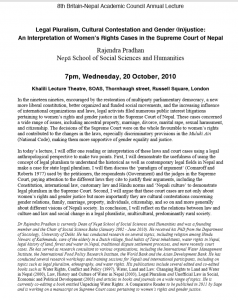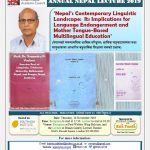Annual Lectures Britain - Nepal Academic Council › Activities › Annual Lectures
Latest News
FINAL Conference Programme: BNAC Nepal Study Days, 24-25 April 2025FINAL Conference Programme: BNAC Nepal Study Days, 24-25 April 2025 The final conference programme o...
Read MoreAnnual Lecture 2010- Dr Rajendra Pradhan
October 20, 2010The 2010 BNAC Annual Lecture entitled “Legal Pluralism, Cultural Contestation and Gender (In)justice: An Interpretation of Women’s Rights Cases in the Supreme Court of Nepal” delivered by Dr Rajendra Pradhan of the Nepâ School of Social Sciences and Humanities, was held at SOAS on Wednesday, 20 October, Khalili Lecture Theatre.
Click here to read the abstract, here to listen to an audio recording of the lecture or here to be taken to where the talk is archived. Click here to read a news piece about the lecture on NepalNews.com.
Description
Dr Rajendra Pradhan is currently Dean of Nepâ School of Social Sciences and Humanities and was a founding member and the Chair of Social Science Baha (January 2002 – June 2010). He received his PhD from the Department of Sociology, University of Delhi. He has conducted research on several topics, including religion among Hindu Newars of Kathmandu, care of the elderly in a Dutch village, food habits of Tarai inhabitants, water rights in Nepal, legal history of land, forest and water in Nepal, traditional dispute settlement processes, and more recently court cases. He has served as research consultant to various organisations, including the International Water Management Institute, the International Food Policy Research Institute, the World Bank and the Asian Development Bank. He has conducted several research workshops and training sessions for Nepali and international participants, including on topics such as legal pluralism, ethnography, and water rights. His publications include several edited and co-edited books such as Water Rights, Conflict and Policy (1997), Water, Land and Law: Changing Rights to Land and Water in Nepal (2000), Law, History and Culture of Water in Nepal (2003), Legal Pluralism and Unofficial Law in Social, Economic and Political Development (2003) and articles in books and journals on a wide range of topics. He is currently co-editing a book entitled Unpacking Water Rights: A Comparative Reader to be published in 2011 by Sage and is working on a manuscript on Supreme Court cases pertaining to women’s rights and gender justice.
Abstract
In the nineteen nineties, encouraged by the restoration of multiparty parliamentary democracy, a new more liberal constitution, better organized and funded social movements, and the increasing influence of international organizations and laws, legal activists filed numerous public interest litigations pertaining to women’s rights and gender justice in the Supreme Court of Nepal. These cases concerned a wide range of issues, including ancestral property, marriage, divorce, marital rape, sexual harassment, and citizenship. The decisions of the Supreme Court were on the whole favourable to women’s rights and contributed to the changes in the laws, especially discriminatory provisions in the Muluki Ain (National Code), making them more supportive of gender equality and justice. In today’s lecture, I will offer one reading or interpretation of these laws and court cases using a legal anthropological perspective to make two points. First, I will demonstrate the usefulness of using the concept of legal pluralism to understand the historical as well as contemporary legal fields in Nepal and make a case for state legal pluralism. I will then discuss the ‘paradigm of argument’ (Comaroff and Roberts 1977) used by the petitioners, the respondents (Government) and the judges in the Supreme Court, paying attention to the different laws they cite to justify their arguments, including the Constitution, international law, customary law and Hindu norms and ‘Nepali culture’ to demonstrate legal pluralism in the Supreme Court. Second, I will argue that these court cases are not only about women’s rights and gender justice but more importantly they are cultural contestations concerning gender relations, family, marriage, property, individuals, citizenship, and so on and more generally about different visions of Nepali society. In conclusion, I will reflect on the relations between law and culture and law and social change in a legal pluralistic, multicultural, predominantly rural society.
Keywords
Supreme Court of Nepal, women’s rights, gender equality, Muluki Ain, Legal anthropology, Hindu norms
This record’s URL: http://www.dspace.cam.ac.uk/handle/1810/226699
Rights
Creative Commons Attribution-Noncommercial-No Derivative Works 3.0 Unported



